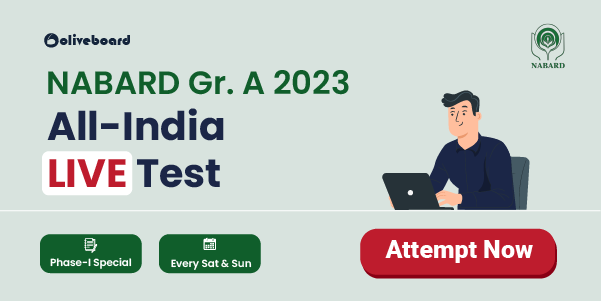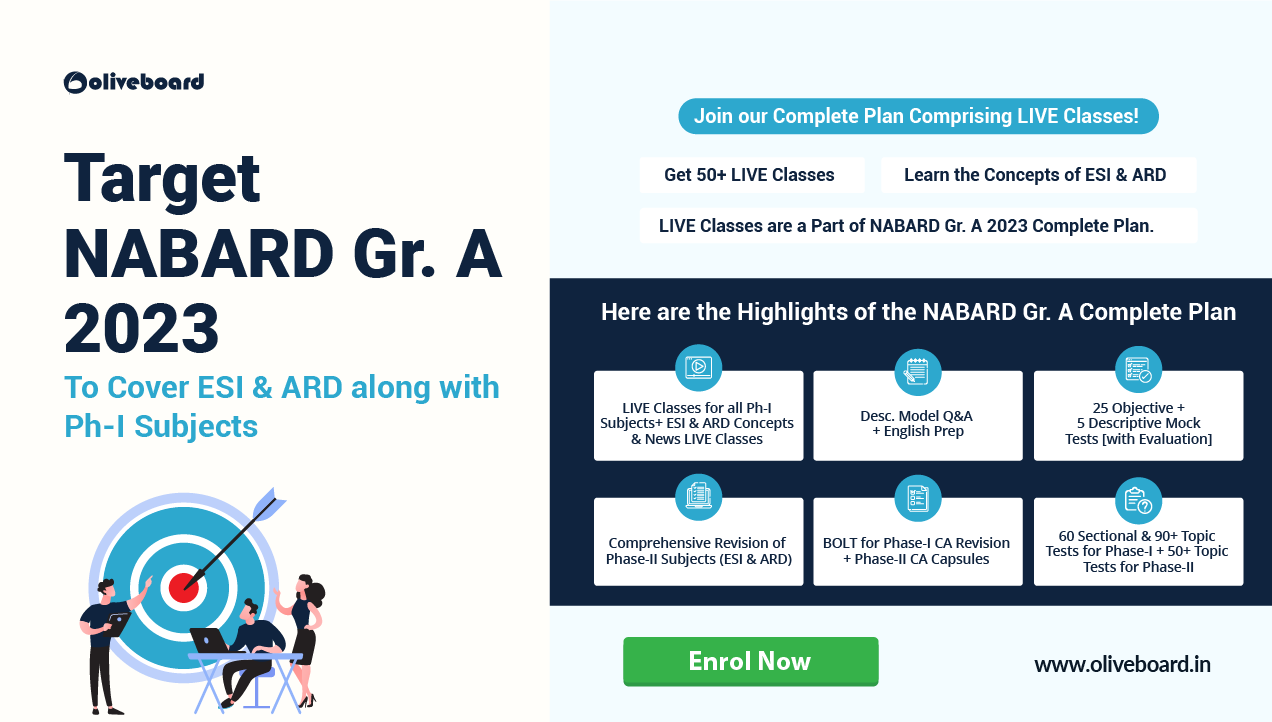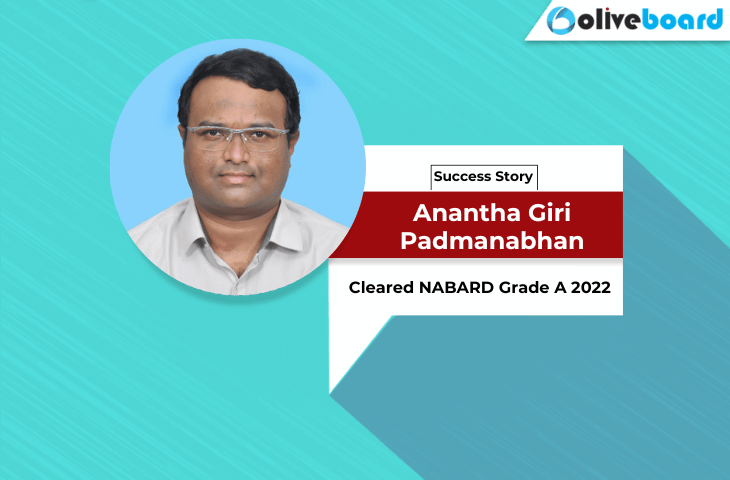Read the success story of Anantha Giri Padmanabhan, who cleared this prestigious exam on his very first attempt. Throughout his journey, he kept himself very positive and recommends the same to every aspirant.
Anantha’s Preparation Strategy
Hi, My name is Anantha Giri Padmanabhan. I Graduated with a Bachelor of Technology (Horticulture) from Tamil Nadu Agricultural University and Worked as Technical Executive at Mondelez India Foods Private Limited.
Ace your NABARD Grade A Phase 1 Exam with us. Attempt the NABARD Grade A Live Test every Saturday & Sunday for FREE.

Strategy for NABARD Grade A Phase-1
- For ARD, I relied on UG and Oliveboard notes for static and current affairs respectively.
- For ESI, I focused on fundamental concepts from Introductory Macroeconomics NCERT, Budget, and government schemes.
- For Qualifying sections like English, Quants, and Reasoning, repeated practice through full-length tests in the Oliveboard platform
- For Decision Making and Computer Knowledge, I relied on common sense and practical knowledge I Identified areas of weakness through test feedback and compared it with previous years’ sectional cut-offs to understand where and how much improvement was required. Also attending mocks gave an idea of time distribution among various sections which helped in fine-tuning the strategy for Phase 1.
Strategy for NABARD Grade A Phase-2
For Phase 2, the reading materials were the same. What differed was the approach toward the materials. There was more emphasis on finer aspects compared to Phase 1. For example, learning the years of the launch of the program, detailed features of the schemes, learning 400-500 words about flagship schemes with a focus on keywords, and having some data on hand for value addition in essay and descriptive answers (like share of manufacturing in India’s GDP, FDI inflow in India, poverty line estimates) can help fetch good marks in Phase 2.
I practiced Paper 1 and Descriptive Answer writing in Oliveboard and the feedback was encouraging. Here the experience of UPSC answer writing came useful. As far as descriptive answer writing is concerned 3 points are important (in that order) – Structure (with a relevant introduction, main answer, and optimistic/prescriptive/suggestive conclusion), Content (relevant and to the point which answers the question), Value Addition (Index rankings, census/NFHS/NSS/Economic Survey data, real-world examples). Even if the compulsory question is hard to answer with less content, having a good structure and related value addition can help fetch decent marks. That needs to be complemented with good scores in non-compulsory questions. Finally, time management is very important.
Paper completion should be the most important objective as far as Paper 1 and descriptive sections are concerned. For Paper 1, I attempted Essay first since it required original thinking, proper flowing structure, and giving final form to the required essay. I followed it with letter writing which usually does not take a lot of time as it requires only sticking to the relevant (i.e. formal or informal) format.
Finally, I managed to finish with Precis where the emphasis is on understanding and condensing the given passage according to the word requirements. Always keep an eye on the word limit at the bottom of the screen. It is easy to miss and overshoot the limit unless you are paying attention. Timing mock tests and regular typing practice can give an idea of how much time is consumed for each section and how to optimize it according to our strengths. These are non-negotiable.
In Phase 2 it’s these aspects that differentiate the aspirants because in this phase the preparation level is pretty even among selected candidates.
Strategy for Interview
The interview is basically a matchmaking exercise and the objective is to show that you got the right temper and personality for the job. The knowledge level has already been tested in both phases so the important thing in the interview is how you answer the questions and not what you answer. In order to prove you are the right person, it is important to understand what NABARD does and how you fit in the organization. The NABARD website has excellent coverage of all the activities, achievements, and schemes of NABARD in a user-friendly format. The Annual Report gives ideas about the latest achievements and the financial condition of NABARD. Making notes out of these and practicing answering them in the mirror/friend can help build confidence.
Also, check out the below-given links
| NABARD Grade A Study Material | NABARD Grade A Preparation Strategy | NABARD Grade A Previous Year Papers |
| NABARD Grade A Study Plan | Government Schemes for NABARD Grade A | NABARD ESI ARD Notes |
Having well-constructed bio-data can help in reducing the ‘unknown unknowns’ to ‘known unknowns’. It is not easy to predict what questions will be asked in the interview. But the scope of questioning can be limited to your advantage if the bio-data has points that grab the attention of the interview panel members (like work profile, hobbies, and educational background). Based on the information in bio-data 40-50 questions can be generated and in all probability, 7-8 questions in the interview will be from those questions. Make sure to link your answers to activities of NABARD (like suggesting training SHGs for establishing horticulture nurseries which leads to a question about NABARD’s initiatives for SHGs). Also, expect to not know the answers to 2-3 questions. In such scenarios, it is best to be humble and accept that you do not know the answer with a smile. Proper appearance (posture, hand gestures) and having a positive and cheerful attitude throughout the interview are important. Even when the going gets tough (like 2-3 tough questions in a row) it is important to keep cool to recover ground and finish off in a flourish. You made it this far! Believe in yourself!
How did Oliveboard help you in your journey?
I made use of the Oliveboard platform for Phase 1 Full-Length Mock Tests, Phase 2 tests, and Mock Interviews. I received valuable feedback in all these phases which helped me identify strengths and shortcomings and enabled me to give my best performance in important moments.
Would you recommend Oliveboard to other aspirants?

Some words of wisdom that you want to share with other aspirants.
“The journey to good things is not linear or straightforward. Expect obstacles and setbacks throughout your journey. Persistence and patience matter more than perfection. Finally, focus on what you can control and don’t worry about things beyond your control.”
Stay Tuned for more such inspirational and Informative stories.
How to Prepare for NABARD Grade A Exam?
If you are a candidate who has never prepared for the NABARD Grade A Exam before and is scared of the Agriculture section that is asked in the exam, then you must check out the following success stories:
Success Story of Anantha Giri Padmanabhan
Success Story of Himanshu Baliyan
Special Note: Any Graduate candidate from any discipline can apply for this exam. With a systematic way of preparation, aspirants can smoothly get good marks in the Agriculture section.
Also, our experts have curated a personalized mentorship program and various other courses to help you out till the end. You just need to click on the link that is given below, log in with the registered email ID, if existing user/ sign up with a new email ID, if new user.

Ebooks Specifically for NABARD Grade A Exam 2023: Download for FREE
- Free Ebook on Top 40 ARD Questions for NABARD Grade A – Part 1
- Download Top 40 ARD Questions for NABARD Grade A – Part 2 FREE Ebook
- Download Top 40 ARD Questions FREE Ebook for NABARD Grade A – Part 3
- Agriculture Basics for NABARD Grade A 2023: Download FREE Ebook
- Agriculture Markets for NABARD Grade A 2023: Download FREE Ebook
- Types of Soil for NABARD Grade A 2023: Download FREE Ebook
- Irrigation Management, Types & Sources for NABARD Grade A 2023
- Water Resource Management for NABARD Grade A 2023
- Nature of Indian Economy for NABARD Grade A 2023
Download FREE Ebooks on Government Schemes for all Regulatory Exams: IRDAI, RBI, NABARD, SIDBI, SEBI, IFSCA
- Final Revision of Important Govt Schemes for RBI Grade B – Download FREE Ebook
- FREE Ebook on Top 10 Govt Schemes from Ministry of Agriculture: Part 1 – Download
- FREE Ebook on Top 10 Govt Schemes from Ministry of Agriculture: Part 2 – Download
- Download Top 5 Government Schemes From the Ministry of Education
- Download the Free Ebook on Top 6 Govt. Schemes from the Ministry of Finance
- Ebook on Top 5 Initiatives of NITI Aayog – Download FREE
FREE Ebooks on General Awareness, ESI, FM & Miscellaneous Topics for all Regulatory Exams: IRDAI, RBI, NABARD, SIDBI, SEBI, IFSCA – Download
The syllabus of all the regulatory exams is somewhat similar, so practicing and learning from other exam-specific ebooks are also beneficial in the preparation. Here, we have compiled all the latest ebooks that will help you ace the exam.
- Download RBI Grade B 2023 GA Answer Key Ebook
- Get RBI Grade B 2023 ESI & FM Objective Questions Answer Key Ebook
- Download RBI Grade B 2023 ESI & FM Descriptive Questions Answer Key Ebook
- Free Ebook on Top 40 ARD Questions for NABARD Grade A – Part 1
- Download Top 40 ARD Questions for NABARD Grade A – Part 2 FREE Ebook
- Download Top 40 ARD Questions FREE Ebook for NABARD Grade A – Part 3
- Get a FREE Ebook on Key Highlights from the Economic Survey 2022-23
- Download RBI Annual Report 2023 Important MCQs: Part 1 FREE Ebook
- Download RBI Annual Report 2023 Important MCQs: Part 2 FREE Ebook
- Top 50 Banking & Finance CA for all Regulatory Exams (March-April 2023)
- RBI Bolt March 2023 Summary FREE Ebook
- Top 100 PIB Current Affairs MCQs for RBI Grade B 2023: Part 1 – Download FREE
- Top 100 PIB Current Affairs MCQs for RBI Grade B 2023: Part 2 – Download FREE
- FREE Ebook on Introduction to Management
- FREE Ebook on Indian Agriculture
- Insurance Sector in India FREE Ebook
- International Economic Institutions FREE Ebook
Download FREE Ebooks on QRE (Quantitative Aptitude, Reasoning, English) for all Regulatory Exams: IRDAI, RBI, NABARD, SIDBI, SEBI, IFSCA
Download all the ebooks for FREE and enhance your preparation.
Quantitative Aptitude Ebooks
- Download the Free Ebook on Top 50 Quants Questions for IRDAI Assistant Manager
- Top 25 Number Series Questions for RBI Grade B 2023 – Download FREE
- Most Repetitive Quants Questions for RBI Grade B 2023 – Download FREE Ebook
Reasoning Ebooks
- Download the Free Ebook on Top 50 Reasoning Questions for IRDAI Assistant Manager
- Most Repetitive Reasoning Questions for RBI Grade B 2023 – Download FREE Ebook
- Top 25 Puzzle Questions for RBI Grade B 2023: Download FREE
- Top 25 Syllogism Questions for RBI Grade B 2023: Download FREE
English Language Ebooks
- Download the Free Ebook on Top 50 English Questions for IRDAI Assistant Manager
- Most Repetitive English Questions for RBI Grade B 2023 – Download FREE Ebook
- FREE Ebook on Top 25 Subject Verb Agreement Questions for RBI Grade B 2023: Download
- Ebook on Top 20 Para Jumble Questions for RBI Grade B 2023: Download FREE
- Top 100 Idioms & Phrases for RBI Grade B 2023: Download FREE Ebook
- Top 135 One-Word Substitutions for RBI Grade B 2023: Download
Preparing for Regulatory Exams? Need regular updates of CA, Notifications, Free Ebooks, YT Sessions, and More, then Join Our Regulatory Whatsapp Channel.
If you are preparing for Regulatory Exams, then do not forget to check out all the blogs on the regulatory exams. Check Regulatory Exam Blogs.
Get Daily FREE Material for RBI Grade B, NABARD Grade A, SEBI Grade A, IFSCA Grade A, and SIDBI Grade A, IRDAI Assistant Manager – Join Oliveboard’s Regulatory Exam Telegram Channel
Check out all the videos for RBI Grade B, NABARD Grade A, SEBI Grade A, IFSCA Grade A, and SIDBI Grade A, IRDAI Assistant Manager- Subscribe to Oliveboard’s Regulatory Exam Youtube Channel
Also, check out
| RBI Grade B Notification 2023 | IRDAI Assistant Manager Notification 2023 |
| SEBI Grade A Notification 2023 | IFSCA Grade A Notification 2023 |
DOWNLOAD THE RBI, NABARD, SEBI Prep App FOR ON-THE-GO EXAM PREPARATION
The app provides comprehensive study material in the form of online courses to ace these examinations. The study material ranges from online LIVE classes, video lectures, study notes, revision sessions, past year papers, topic tests, the objective plus descriptive mock tests, mock interviews, and much more.

- Indian Bank Recruitment 2025 Out for 1500 Apprentice Posts
- Indian Bank Apprentice Salary 2025, Pay Scale, Salary Structure
- Indian Bank Apprentice Syllabus & Exam Pattern 2025, Check Details
- Railway RPF Syllabus 2024, Check Exam Pattern, Topic And Syllabus
- SSC JE vs RRB JE, Which Is Better? Know Detailed Comparison

Hello there! I’m a dedicated Government Job aspirant turned passionate writer & content marketer. My blogs are a one-stop destination for accurate and comprehensive information on exams like Regulatory Bodies, Banking, SSC, State PSCs, and more. I’m on a mission to provide you with all the details you need, conveniently in one place. When I’m not writing and marketing, you’ll find me happily experimenting in the kitchen, cooking up delightful treats. Join me on this journey of knowledge and flavors!

